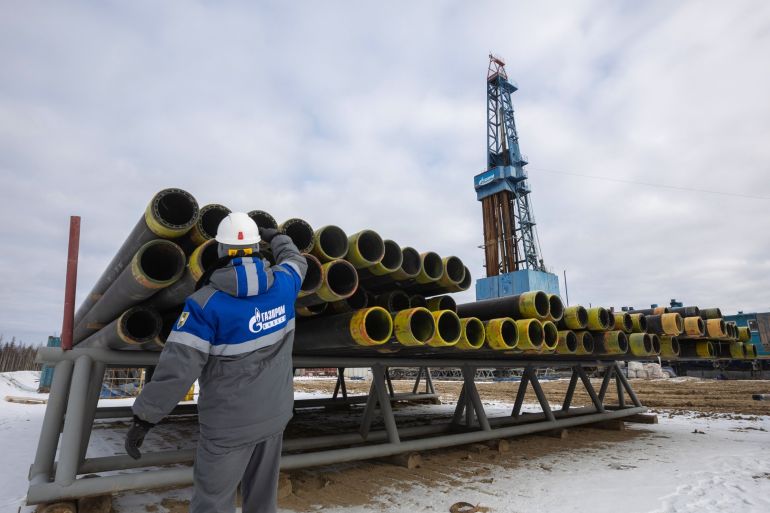Paying for Russian gas in roubles is ‘unacceptable’, says G7
German Economy Minister Robert Habeck says the Group of Seven has called ‘on the companies concerned not to comply with Putin’s demand’.

Paying for Russian gas in roubles would be unacceptable, Group of Seven (G7) countries have reiterated, with German Economy Minister Robert Habeck saying this recent demand showed Russian President Vladimir Putin’s back was “against the wall”.
“All G7 [energy] ministers agreed that this is a unilateral and clear breach of the existing agreements,” said Habeck, whose country holds the presidency of the G7 most industrialised nations.
Keep reading
list of 3 itemsUS, EU announce plan to reduce European reliance on Russian gas
EU clinches US LNG deal in bid to curb reliance on Russian gas
“Payment in roubles is not acceptable and … we call on the companies concerned not to comply with Putin’s demand,” he said on Monday.
Putin announced last week that Russia would only accept payments in roubles for natural gas deliveries to “unfriendly countries”, which includes all European Union members.
Economists said the move appeared designed to try to support the rouble, which has collapsed against other currencies since Russia invaded Ukraine on February 24 and Western countries responded with far-reaching sanctions against Moscow. But some analysts expressed doubt that it would work.
Asked by reporters earlier on Monday if Russia could cut natural gas supplies to European customers if they reject the demand to pay in roubles, Kremlin spokesman Dmitry Peskov said in a conference call that “we clearly aren’t going to supply gas for free.”
“In our situation, it’s hardly possible and feasible to engage in charity for Europe,” Peskov said.
Putin’s ‘back against the wall’
The move comes as Moscow struggles to prop up its economy in the face of debilitating sanctions imposed by the West over his invasion of Ukraine.
“I think we must interpret this demand as Putin having his back against the wall,” Habeck told reporters following a virtual meeting with his G7 counterparts.
The G7 bloc consists of Britain, Canada, France, Germany, Italy, Japan and the United States.
French President Emmanuel Macron on Friday rejected Putin’s gas-for-roubles demand.
The Russian move “is not in line with what was signed, and I do not see why we would apply it,” Macron said.
Like other European countries, Germany is racing to reduce its heavy reliance on Russian energy imports in the wake of the Ukraine war.
Germany has to wean itself off Russian oil, gas and coal “in order not to strengthen the regime”, Habeck said, and because Moscow has revealed itself to be “an unreliable supplier”.
Berlin was quick to pull the plug on the massive Nord Stream 2 gas pipeline with Russia in protest over Putin’s aggression.
But the German government has so far resisted calls to impose an embargo on Russian energy imports, saying that to do so could plunge Europe’s biggest economy into chaos.